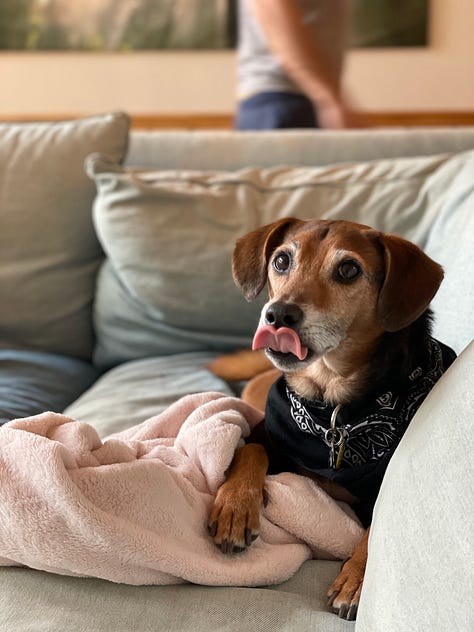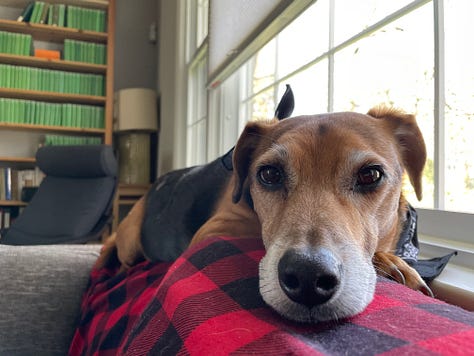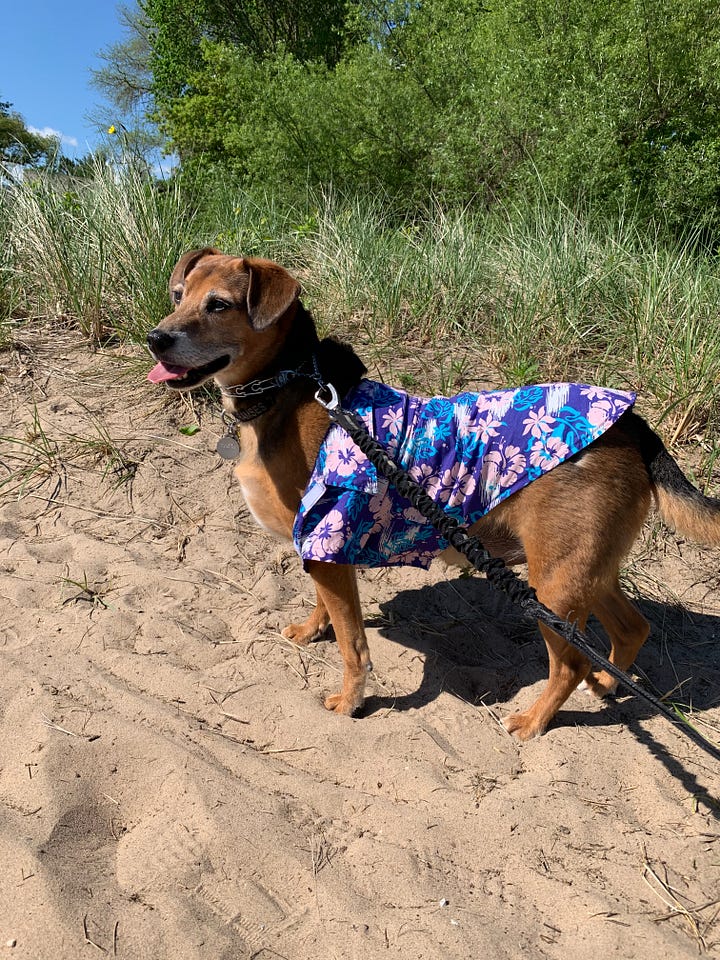Looking into his grey eyes and fondling the dense growth on his shoulder, she said, “We are bound to hurt one another so much, again and again. We are so terribly different.” “Yes,” he said, “But the more different, the more lovely the loving.” (41)
Sirius (1944) by Olaf Stapledon is a speculative book about an extraordinary dog, a super-sheepdog of human-level intelligence who struggles all his life with his nature, his talents, and his disabilities—most notably his lack of hands. Without spoilers, I can tell you that this is a tragedy, and if you don’t leave the book heartbroken, it’s because you have no heart. Or you’re a cat person. Same difference.
I had the privilege of caring for an extraordinary dog for six years of his almost-13-year life. Ramses was bright, loving, gentle, and mischievous. He was loved by all who knew him, and he loved everyone right back. He was my husband’s dog before we met, but he quickly became my dog, too.





Ramses passed away in June 2023. It’s been a year and a half and I still feel his loss acutely. Every time I enter my quiet home, with no burst of puppyish excitement to greet me; every time I cut an apple or a cucumber unmolested is an aching reminder of the void he left in our lives.
Ramses loved to cuddle on the couch as much as he loved frolicking in freshly fallen snow. He was the perfect roadtrip companion. He was the peacekeeper at his dog park, imploring everyone to just get along whenever there was a skirmish. He said hello to humans, not their dogs. He once swiped a full package of English muffins from the counter and ate them all. His ears were softer than velvet.
I’ve always loved dogs, but Ramses was the first dog for whom I shared primary responsibility. I didn’t know, until Ramses showed me, that I could be self-sacrificing, that I could love unconditionally. In that sense, awful as it was, even his end-of-life illness was a kind of gift. Ramses made me a better human being.
All this to say, I came to Sirius with some baggage. This was actually my second time attempting to read it— although it’s only 159 pages long, ten years ago I read 40 pages and the premise seemed so tragic to me that I couldn’t go on. While I was correct in assuming there was no happy ending possible from the starting conditions, I underestimated how worthwhile the whole experience would be. There are no cheap tricks here; every sore heartstring is well-earned. I’m glad I returned to Sirius, even if it was one of the three books that made me cry in 2024. It’s one of the best books I read last year.
Sirius is a sheepdog/German shepherd mix who has been bred and tampered with in the womb by an English scientist to generate a larger and more efficient brain and greater longevity. He is raised in the Welsh highlands alongside the scientist’s family, and is nurtured as though he were no different from the family’s youngest daughter, Plaxy. Sirius develops the ability to speak English, and eventually to read and write. Sirius and Plaxy grow incredibly close; they consider themselves each half of one being (Sirius-Plaxy), and they learn from each other’s unique talents.
“I am to tell you, Robert, that Sirius and Plaxy grew up together like the thumb and forefinger of a hand, that he loves me in the way that only dogs can love, and much more now that I have come to him, but that I must not feel bound to stay with him, because by now he can fend for himself. Whatever happens to him ever, I—how did you say it, Sirius, you foolish dear?” He put in a quick sentence, and she continued, “Oh, yes, I am the scent that he will follow always, hunting for God.” (5)
However, as they get older and Plaxy goes off to school, their inherent differences create more space between them, and Sirius grapples with what it means to be a singular being. He struggles with the parts of the human world that are inaccessible to him, particularly through his lack of hands, which he views as a form of torture. He struggles, too, with what he calls his ‘wolf nature,’ that primordial force within him that exceptional intelligence cannot quell. Sirius is like the ‘inside you are two wolves’ meme brought to life.
For all the philosophical intensity of the subject, much of the language is beautiful, bucolic, and soothing. There are long sequences that describe the business of sheep herding in the Welsh countryside. I read these with calm fascination, never boredom. A later chapter that describes Sirius’s integration into a segment of the academic community in Cambridge reminded me strongly of the way decadence has a corrupting influence on Shevek in Ursula LeGuin’s The Dispossessed (1974). I haven’t found any evidence to suggest that there is a direct influence from Stapledon to LeGuin, but both writers exhibit a sophisticated rendering of philosophy and psychology that are often lacking in science fiction (and all other forms of fiction, for that matter).
Another interesting aspect is that this book was written and published before the end of the Second World War. Stapledon explores some of the ways that English and Welsh society was stressed by the war and situates Sirius’s struggle in that context. I am always interested in the art that is created in the midst of war and upheaval, particularly when it touches on the contemporary action. I like to remind myself that Casablanca came out in 1942, long before the outcome of the war was certain. It takes a certain kind of courage (and perhaps some foolhardiness) to dare to create art that grapples with world-historical events before the chips have fallen. I don’t know that I have the guts. History happens so fast. What’s remarkable about Sirius is that it’s so stately and reads like the distillation of many years of studied thought, and yet it manages to incorporate the maelstrom of war and the paranoia of society of a very specific era.
I highly recommend Sirius if you’ve ever anthropomorphized your own dog. Or if you’ve ever wondered if your own consciousness is a curse. As much as I’d like this to be a book about a super-dog, on another level it’s really a book about man and his struggles between his animal and “higher” natures. Even a cat person can (probably) relate to that.
Sirius (1944) by Olaf Stapledon: 9.3/10





never heard of this before. interesting title. sort of reminds me, in a very loose way, of rats of NIMH
Definitely I have to read this book now. It sounds like a departure from Stapledon's best-known narratives, which work impersonally over huge time frames ("Last and First Men" and "Star Maker"). You've made me curious about his skills at characterization, especially when a dog is the main character. Oh, and Ramses is beautiful.